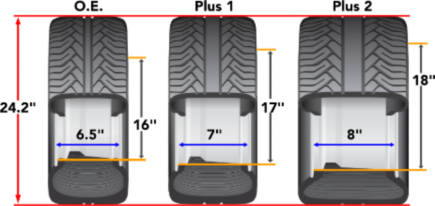When it comes to upsizing your tires, there's a few things you should know.
"Plus one" means that you increase the wheel diameter by one inch more than the original equipment (OE) wheel. "Plus two" means increasing the wheel diameter by two inches, and likewise with "plus three" increasing three inches, and so on. "Plus zero" just means the same wheel size as the OE but an increase in just the tire's size.

For example: You have a 16x6.5 wheel and 205/55R-16 tire. A typical plus one (1") size would be a 17x7 wheel and a 225/45R-17. Then, a plus two (2") would be 18x8 and 235/40R-18.
18x8 wheels are a pretty popular upgrade and come in a large variety of available fitments.
When it comes to downsizing, "minus one" is a decrease in wheel size by one inch. It's common to downsize in winter since this increases the tire sidewall height and may even lower the cost of smaller aftermarket wheels. This is helpful to know for your next winter tire changeover.
"Plus size" tires mean an increased wheel diameter, which may require a wider tire as well. Make sure that your new tires and wheels are of a compatible width and can maintain the original load-carrying capacity. It's helpful to familiarize yourself with some wheel size basics.
Sometimes, customers will confuse wheel offset and backspacing for plus sizing. However, plus sizing involves the measurements of the wheel and tire themselves, as opposed to how they sit on and relate to the wheel assembly.
PROS AND CONS OF PLUS SIZING
Like any vehicle modification, changing your OE tire size to an oversized tire comes with its pros and cons.
- Factory Size:
- Pros: Best for drivers seeking well-rounded performance in a variety of driving situations.
- Cons: Drives limited to factory size settings and features.
- Plus One (1"):
- Pros: Better handling and cornering.
- Cons: Increased road noise and decreased ride quality.
- Plus Two (2"):
- Pros: Aesthetically pleasing and increased responsiveness.
- Cons: Increased road noise and decreased ride quality.
- Plus Three (3") and above:
- Pros: Maximum style, better handling and responsiveness.
- Cons: Significantly reduces suspension and ride quality. Potholes, curbs, snow and ice, and other hazards pose an extra risk to vehicles rolling on these larger wheels.
In sum, the benefits of big tires and wheels is mostly aesthetic appeal, improved handling, increased stability and steering response.
On the other hand, it can diminish ride comfort and increase noise. Smaller sidewalls don't absorb impacts as effectively while larger wheels tend to be heavier, decreasing fuel economy, acceleration and any road noise reduction capability.
Always consult your vehicle owner’s manual and tire manufacturer’s information for their recommendations for proper plus sizing. America's Tire technicians can also help you determine the best wheel and tire size for your vehicle to get the look you want.
However, if you think that plus sizing is for you then you can turn to no one better than us at America's Tire, your wheel and tire experts. We offer the largest inventory of aftermarket wheels in the industry, and our huge selection of tires and know-how can’t be beaten either. Just check out our fabulous wheel and tire packages!
You can save some time by booking an appointment! Save time, get in line first! If you have any questions or need any assistance, stop by your local America's Tire and we'll get you taken care of!
Get a shorter wait time in-store when you buy and book online!
